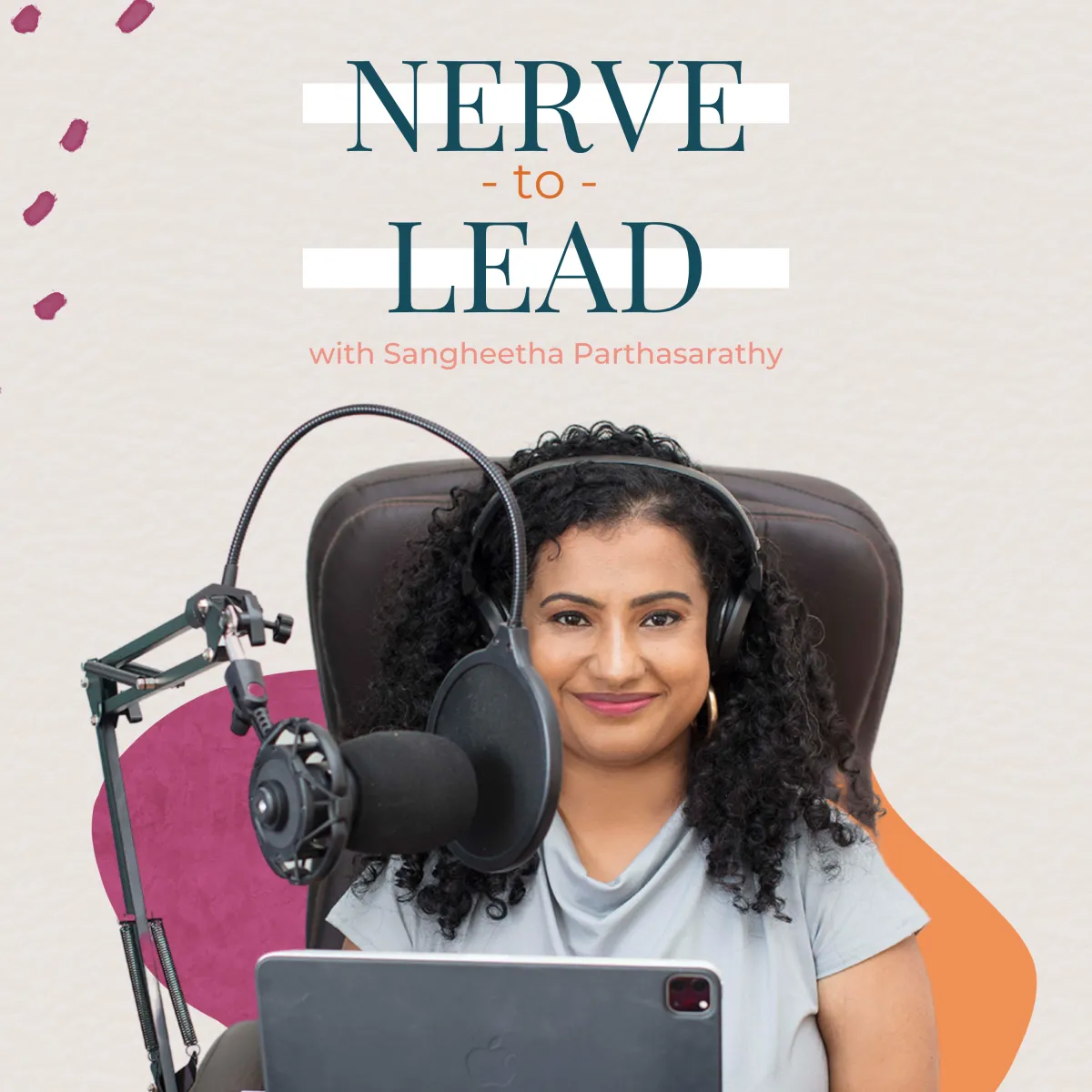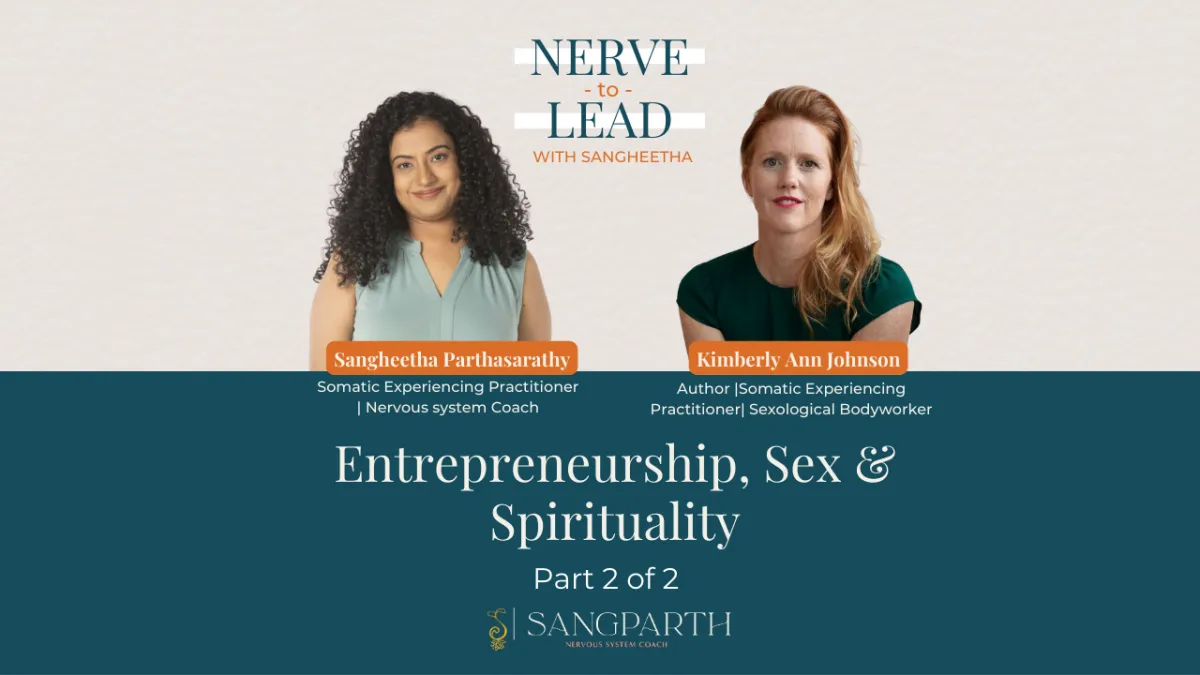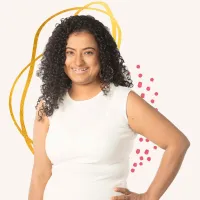The Nerve To Lead Podcast
with Sangheetha Parthasarathy
On The Nerve to Lead podcast, your host, Sangheetha Parthasarathy encourages CEOs, Entrepreneurs, deep thinkers, the round-pegs-in-square-holes, change-makers and visionaries to share their stories of power, pleasure and passion.
We cover everything from nervous system regulation, high achievement, trauma healing, parenting, partnership and attachment, intimacy and more. You will also get to learn the stories and knowledge from our expert guests and thought leaders.

Apply to be a guest on
Nerve to Lead Podcast
Welcome to 'Nerve to Lead' podcast. Apply here to be a guest on the podcast with Sangheetha Parthasarathy.
Invite Sangheetha as a
guest to your podcast
Invite Sangheetha, a Nervous System Coach, Speaker and Consultant to be a guest on your podcast.

Entrepreneurship, Sex & Spirituality (Part 2 of 2)
Kimberly Ann Johnson is a bestselling author, doula and entrepreneur. In part two of my conversation we discuss motherhood, sex, sexuality, high achievement immigration, and many aspects of South Asian somatic work.
You can connect with Kimberly on her website: https://kimberlyannjohnson.com/
LISTEN TO THE EPISODE
EPISODE TRANSCRIPTS
INTRODUCTION
Welcome to the Nerve to Lead podcast. Here we explore power, pleasure, leadership, identity, belonging, parenting, and couplehood, and explore stories of navigating through life, finding both authenticity and attachment through the common lens of the nervous system. I am your host, Sangheetha Parthasarathy, and I'm so glad you're here. Welcome back to part two of my chat with Kimberly Ann Johnson. Kimberly is a bestselling author, entrepreneur, and a thought leader who talks about sex, birth, and trauma.
MOTHERHOOD AND SEX - ARE YOU ALLOWED ?
I wanna get back to this, the reclaiming the feminine piece, the spirituality versus sexuality, also very big point you make about motherhood and sex. I think that's again, globally that's cultural. That if when one becomes a mother, they're somehow deified and put on a pedestal and superhuman and all these memes that come up about mothering and motherhood, and yet we're so alone and we're not doing it with the village that we were supposed to do it with. But situating sex and sexuality in that context, I think is really, really powerful. And what you talk about having sex that changes the world and sex and pleasure as activism. Tell us a bit more about that.
FEMINIZATION OF SEX AFTER BIRTH
Well, I was reading a book by Laura Gutman, who's an Argentinian psychologist called Motherhood: Coming face-to-face with your own Shadow, and she coined this phrase, the feminization of sex. And she was talking about how that's what happens postpartum. Because after we have a baby, our female pleasure has to be at the center of the experience because the female body is the one that gave birth. And that's the one that's undergone all of these changes. And so the pacing has to be led by that person. And that really is an awakening for most people, because if our sex beforehand was performative or was adrenaline driven, is like now we can't really override that for the most part because maybe it's painful, maybe it's uncomfortable, maybe there's like leftover stuff from the birth that's still with us. And so we're really asked to learn how to communicate much more clearly about our desires, which I think most people take as a bit of a punishment, a bit of a bummer. I think there's a lot of grief that goes into that because we may have been having sex that we weren't even, we thought we were enjoying, but it was kind of singularly toned. And then afterwards we realized like, wow. And I think there's a sense from a lot of partners, wow, I thought everything was okay before, and now you're telling me it wasn't good before, and now you're telling me it has to be completely different. So to me, it's a real call for maturation in a deeper level of communication and bringing more of ourselves to our sex, more of our emotionality, more of our soul. And there's a real opportunity for deepening of communication because we know throughout our lives that our physical arousal journey is gonna change for men and women. And this is one place where we really have a chance to deepen in our connection to ourselves and to another person or people.
"WOMEN PEAK SEXUALITY AT 40" - IS THAT A MYTH ?
That's beautiful. And I think the first time, and I can't remember where I heard it the first time, is that women peak sexually at 40 and at 40 the thing is having libido of an 18 year old man and that's just mind blowing because you don't think of postpartum women that have given birth or are done with reproductive journeys as well, you think of them as fertile, but you don't really think of them as sexual or having desires.
DECOUPLING SEXUALITY FROM FERTILITY
And so it's just, it opens up a big discussion. It's interesting, because right now you're kind of placing fertility and sexuality together, which of course they're related. And especially now I'm in my non fertile years, and we could call it like a non fertile brain because our brain does change based on these things.
WHAT IS SEXUALITY ?
I think this just calls into question like what actually sexuality is. And if we think about it just in terms of fertility and reproduction, that's one kind of sex. But if we think about it beyond that, then that's an elemental part of expression and who we are, and it's independent of how we look, and it's independent of our size and it's independent of our preferences. That is just our erotic nature that takes shape, that statistic about like women's sexual prime. I mean, our reproductive prime is around 28 and for men it is earlier. But I think that idea of a sexual prime is really probably libido based. And of course that can't be separated from all the conditioning that's always towards youth, that everything that's beautiful is youthful. That feeling that we may have had where we're ready to have sex at any time or that desire is like right there, that does shift.
But we also, it's possible that we become much more clear with our desire, our communication, much less self-conscious, much more comfortable in our own skin, much less worried about what we look like as we're having sex. All of the social nervous system proclivities of fawning and fitting in start to fade into the background as the estrogen levels drop. And so we're not really so concerned about what anyone else thinks about who we wanna have sex with, how we wanna have sex with them. If we don't wanna have sex at all, we're not concerned about pleasing someone else to do it. And to take that for ourselves and be unapologetic about our own pleasure, which essentially is like really hot, you know?
HOW DOES CHANGING LIBIDO CHANGE YOUR ACTIVISM/ENTREPRENEURIAL WORK ?
Oh, absolutely, absolutely. Yes. And yeah, I think yeah, that makes a lot of sense. And the thing that you say about fertility and reproduction and how it changes the brain and how it changes our entire being, not just our libido, but in the entirety of how we show up in the world. Is there like a sense for how your own journey has been? Like you described now you're in your post reproductive years to when you started, how has that journey into I don't know, activism or having viewpoints or impact or even entrepreneurship, how has that evolved for you?
Well, it's a little bit hard to say because I'm a Gen Xer. I'm almost 49 and, you know, I'm super bored of social media at this point, annoyed, bored, worried about it. And so I don't really, I'm like tired of taking pictures of myself. I'm tired of that. It's hard for me to say if that is my age. And it's like, 10 years ago it was exciting for me to take pictures and to be seen and to explore my erotic identity publicly, to push an edge about what a yoga teacher should do. I remember the first time I did a nude photo shoot and the photos were gonna be online, all of a sudden I was like, oh my God, I'm a yoga teacher and people are gonna see that I'm doing this. And it was a real time thing of like, is it okay to be sexual and to be a yoga teacher? People look up to me as a yoga teacher, so is it okay that I do this? And at that time in my life, which was, that was about 12 years, 13 years ago, that seemed really important. Right now, I don't really feel like that. I don't feel like I wanna like be seen all the time, but it might just be that I'm also exhausted by it because I've been doing it for a long time now. I've been in the public eye in this way having these discussions about what it means to have an erotic identity as a mother, what it means to do that as a single mother, how to find relationships when you're out of partnership and you don't have money for babysitters and you wanna be with your own child. Because that's why I had a kid, Because I really wanted to be with her, working through my own attachment wounding that I had no idea was part of becoming a mom at the same time as single parenting and having a lot of converging challenges. So I think that yeah, it's just, it's become less important to me. Because that is part of it right.
OVULATION AND A PEACOCKING QUALITY
When you're ovulating there is sort of like a peacocking quality to it. There's a magnetic energy to that of people are gonna look at you even if you don't wanna be looked at. But you're also like that's what we love feeling. We love that young energy of being out there, being available, being extroverted, and we don't like the yin feeling of coming towards the bleed and the autumn and wintery season of ourselves. And that's what this time is in perimenopause, is like more of a wintering season. And I do believe that, at least for me, I can tell that this is just a phase and that this isn't like a forever thing, that there will be a time when this experience is complete and I'll have a new spring, which in Chinese medicine they call like post-menopause the second spring for women. But this culture where, for instance, to write a book is not really a big deal anymore. It used to be that you had to be a really good writer. It used to mean that you had something to say and that someone would, but now it just means that you are an influencer and that if you have a lot of followers that you figured out how to get for who knows how, what reason then you can get a publisher deal and you can write a bad book basically. Yes.
Or you can have AI write it for you in a couple of days. Yeah, that's a good point.
KIMBERLY'S FIRST BOOK WRITING EXPERIENCE
Yeah. So it's a weird time and we all have to find a way that we can, what we can live with. And also survival comes into it. It also could be that back then I had no money and I had to figure out a way to make a living. And so I had like a real fire under me to figure it out. And of course, I lived a year at my parents, I also lived, some yoga students of mine let me live above their garage for a year where while I was writing my first book and not pay rent and trade for classes. So it's not that I've been, seen the end point the whole time, but there is something to also just being financially secure that's not making me what I might call, like compromise my ideals, even though that's just what being adult is. Being an adult is about learning how and when you have to compromise your ideals because the world is not conforming to the way that we think it should be. So I go through phases, but I'd say that's kind of my main, I feel much more internal and much less of a desire to be out there. And honestly though too, it's like I've written three books now and I've taught so many people and there's a feeling of like, I don't wanna keep writing about the same thing.
Hmm.
Yeah. I've wrote, I've written about it, I've talked about it, and that's just part of my nature. I like to create and I like to be evocative and innovative and kind of and I tend to be like pioneering and in the front of trends. But it's also because there's a much higher toll to being a public figure than there ever has been. Yes. And so I've gone through major slander campaigns and it makes you just recoil because essentially I love my life, I have a beautiful daughter, I live in a great place, I have a wonderful husband, and there's a million things that I could be doing that feel like they would be valuable in contributing. And so I do take it as like my own Bodhi Sattva vow that I return to offering. But it takes its toll too.
SOMATICS OF HIGH-ACHIEVEMENT RE-ROOTED BODIES
Yes. Yeah, yeah. So tell us about, doing the work has many different connotations, but in this context of really going into the body, that's a different experience. For a lot of my clients, by the time they come to me, they've explored, they have a spiritual practice, a meditative practice, potentially, a therapist, mindfulness, journaling, all of that. And it's really hard to be in the body, the PTSD, looking at it through that lens, you know, labels or no labels. My audience tends to be high achieving, and I used that word in the way, what I mean by that is growing up in early environments where love and belonging was conditional on performance and achievement. So that's the context of that. And then grow up to be pretty successful, I guess in the outside world and in the global scenario, you know, first generation immigrants having that, the model minority, like, oh the Tesla, working for the FAANG companies and, sending two kids to private school and all of that, the million dollar homes in Bay Area. And I ran that race as well.
And then there is this whole big reckoning that comes with it. I think there is that, and for many people it comes through different ways. For me it was birth, and I know that for many others it's grief, it's loss, it's various things where you actually come to reckon with this idea of, wow, this is what coming home to the body as an experience. You know, talk to us about finding the right therapist, the right person. And again, trauma is a very commoditized word, but the, the sense that I'm talking about that is, things that prevent us from leading a whole spectrum of enriching experiences as an adult, authentic experiences, including being available to pleasure.
Hmm.
So, I mean I'm rambling. Well, I Don't think you're rambling.
NUANCES OF ATTACHMENT AND BELONGING IN SOUTH ASIAN FAMILIES
I mean, it's pretty cool how, specific it is about what you're doing and what you're offering and who you're offering it to. And I think it's also interesting to track, because you mentioned the word belonging a couple of times, and in this case, I think that it's really helpful to have somebody who has a similar identity to you. I mean, I recall one of my Indian friends here telling me what a therapist told her about her relationship with her mom. And I just said to her, you're Indian. Like, I don't think that advice applies, that's not how Indian families work.
Yes.
So there, the expectation of differentiation, the expectation of whose decisions belong to whom, I think it's a disservice to apply a western ideal to that because there's a lot about the way that Indian families and culture works. That's wonderful. I'm not saying it all is, I'm not, I'm not saying that it's perfect, but there is something specific to it, and there is a level of belonging and attachment. That's because, it's very rare for someone to only have one person they're attaching to, in an Indian family, you're usually having many generations of people that you're aware of. And again, I know that there's a lot of sides to that, but this preoccupation with our doing what we want to do when we wanna do it, you do you, they should leave me alone, it's all stemming from individualism and unfortunately is also a colonial import.
BINARIES IN SOUTH ASIAN TRAUMA WORK
Absolutely! That hyperindividualism as a trauma response, I think that's the thing, on the one hand, we are veering towards the toxic effects of not individuating and kind of being a cog in the wheel and then we pendulate to the other extreme, which is pretty narcissistic and entitled in itself. I've heard you talk about this many times about this, the hyper individualism side of it, the, the other extreme.
UNLEARNING COLONIALISM IN SOUTH-ASIAN TRAUMA WORK
Yeah. But not even for when I'm talking about the individualism, I'm not even talking about it in like, almost like a personal way. I'm talking about upholding that as something that's, I mean, that that is part of what, I forgot what you called it. You, I think you called it, you had a word for it, but I mean, that is a colonial import, that, Yes. That even how we identify an individual and like, and what healing means and that healing would happen in a one-on-one method where you're. Sure, india has a long, a long, long history of people sitting with themselves as a means to liberation, of course. But I recently read this book, by Rachel Aviv. Did you read this? It's, something, do you know what I'm talking about? It's a woman, she's a journalist. She lives in New York. She was diagnosed with anorexia when she was six years old. And so she talks about that for herself, and then she talks about the category of mental health throughout the world. And there's a woman in India, and it goes through her and her generations, and she would probably be diagnosed as like bipolar or schizophrenic. Mm-hmm. But she's also seen as, she is also a seer. And so people are understanding her as a Rishi also. But it's about the importation of psycho-pharmacology and what happens, the culture when things that have a different way of being understood are suddenly only exclusively pathologized.
COLONIAL IMPRINT LIVING IN OUR BODIES
And that way of dividing people is then considered to be the correct way because it's more modern and it's western and it's professionalized and I remember one time this person who I used to call my guru like telling me that even the way that I carried myself in terms of standing had a colonial imprint, which I understand now because that erectness in the spine, a sense that like I am separate from ground and earth.
BREASTS, BACK, STANCE AND COLLECTIVE SOMATICS
The Breasts, the way you and I talk about this a lot, but and the way women hold our breasts, that is out in a post puberty, if you grew up in a culture that shamed. I've worked with so many people, where there is a way in which your spine and your back and your breasts, have an impact on everything you do after that. Because the whole idea that one is a woman, once you have breasts, you come into a very complicated relationship with your breast. And hence how you show up in the world as a female culturally, you know? so yeah, that I'm just adding to what you were saying about your gait and posture. Yeah.
And now a small break to talk about more resources. We've created an autonomic intimacy checklist for couples, which gives you a framework to understand nervous system to nervous system safety with your partner.
https://www.sangparth.com/intimacy-checklist-form
It's free to download and use. It is available as a link on the episode show notes. And now back to our conversation.
IMPORTANCE OF GUT IN CHOOSING A THERAPIST
Yeah. So you were asking me like how someone should find a therapist or how someone should get care. And the way that I do it, or like if people ask me for recommendations is I just go and I look at people's pictures and I read a few things about their biography and I go with my gut. But that's how I've always done things in terms of finding practitioners, because for me, it's about the person. And I personally want to have a sense that this person that I'm seeing has a life that's something that I admire. Not that I have to want the same life, but that this person feels whole and coherent. And, so that's how I choose.
TRAUMA AS A TOPIC OF DISCUSSION IN INDIA
I'm curious so is trauma something that's accepted in India now? Like is it as hot of a topic as it is in the US?
Yes, I think it is getting there. And I think that's amazing. And then you also have this westernized way in which people, it's the same, when you think about mental health, there is also a huge psycho-pharmacology aspect to it. And then just as in birth, highly medicalized, are you a doula? Only doctors are supposed to be birth influencers. So there is a bit of that, putting barriers into who can practice what, so that that's there on one end. But I think in the collective conscious, and then by that I mean social media, et cetera, there are conversations around trauma, there are conversations about early development. There is a lot of conversation around narcissism and mother wounds and intergenerational trauma. However, again, I think there is a lot of nuance to that. What we patriarchy and gender roles and this colonial angst you know, real economic survival imperative and how it affects the body, and then how it, and so this is my piece,
FIRST GENERATION IMMIGRANT NERVOUS SYSTEM AND REROOTED SOMATICS
I grew up in India and then I went to school in the US where I lived for many years, and then I met my husband, I went to the UK. We're all naturalized British citizens, my daughters are British and then we've repatriated back to India. So the journey of that just re-rooting a nervous system. And then for not refugee based survival reasons, but economic survival reasons, it has an extraordinary impact on the brain and the body. That's my work. That's the kind of the crux of what I do. And and so yes, I think trauma is being more talked about than ever before, and people are starting to understand PTSD. The people that you work with, are they general, and maybe you too are, are you generally very secular, not religious?
SANGHEETHA, ARE YOU SECULAR ?
That's a very interesting and an important question And this is something that is again, everything that's political is personal and vice versa, right? So in terms of the work that I do, I feel like being a feminist and in doing this work, you do have viewpoints. And the reason the word secular triggers the political discussion is because in India, the word secular itself is very politicized.
SOMATICS OF CASTE/CLASS/COLONIALISM IN SOUTH ASIAN BODIES
And then you have the caste on top of it, which is fascinating because, historically caste was not stratified. It was just the job that you did. And then it becomes stratified by who you are born to and therefore becomes stratified. And that's a form of oppression that is sort of like race, but not really. So there is that piece. And the amazing thing is that the higher up one is in the caste hierarchy, the most more disembodied one is, and more up here in the neo cortex one is. And this has to do with the Brahminical pursuit of knowledge, and that knowledge is the ultimate.
I mean, and it's also a demonstration of what you are not, right? Like, you don't have to get your hands dirty in the field. You don't have to do this kind of thing. But what I found interesting, I mean, you can only imagine, I went to India the first time when I was 19, and I looked like I was 12. And everyone's like, what are you doing? Where are your parents? Everyone asked me where my parents are, my parents are in California. Do they know you're here? I'm like, yeah, they know I'm here, it was like so funny. But now that I see the pictures, I'm like, I would ask me the same question. I look like I'm 10 years old.
But there were so many people that told me they don't believe in God. They couldn't believe I was in India because of devotion. And I mean, maybe that's why you're saying that being secular is political, but it's like the audacity to say that spirit doesn't exist or God doesn't exist coming from a culture where it's a spiritist culture, right? Like it's a land-based animistic culture that then, from that springs this cosmology. It's very, it's so modern and it's like saying, you know, I'm a modern person. I'm not that. And I can just imagine that trying to help people find ways to connect, and like you said, uncouple to connect to the richness that is present in the culture is so much a part of belonging.
SOMATIZATION OF GRIEF AND DEATH - WHERE CASTE/COLONIAL IMPRINTS SHOW UP IN THE BODY
Yeah. And so going back to that politicization of the caste layer of trauma slash resilience, that one is carrying in the body with respect to the disembodiment, I know that you're doing this work with birth and death right now. And so this is why I gonna say this is when you think about death, the more land-based and body-based caste is usually lower in, and more in touch with the body. There are a lot of very embodied rituals around death, one of which is berating the chest and crying loudly like ululating, right? This just outpouring, your head is out and there's a very throat based vocal expression of grief. And death is a community based practice. However, the higher up in the caste hierarchy you get, and usually it's with class and more westernized, the higher up in the hierarchy you are, the more intellectual and disembodied you are. Therefore, the grief really has no place to go. And the grief, the process of grieving itself is interrupted because it's all up here. And, you know, it's not appropriate for an urban, educated upper caste woman to scream her lungs out or really berate her chest, right? That would be causing a scene because the higher up in the hierarchy you are, the more white you are expected to be.
SANGHEETHA'S OWN JOURNEY RECKONING WITH PRIVILEGE
Do you do that?
Well, the death thing, the grieving? Yeah, I do. I've not been around death lately, but yeah, I mean, as a somatic practice, yes, But I also come from privilege, English education, urban upper caste, completely, unaware of my privilege until I became an adult and lived in various places. And so I've come to a big sort of, it's been a big awakening for me to reckon with a lot of unearned privilege that I didn't know I had. And I was oblivious to growing up, and all the Westernization and having lived outside India and then coming back in and what does that really mean for me, and in terms of who I am, and so it's been a big process for me as well. But yeah, Beautiful.
KIMBERLY'S UPCOMING PROGRAMS
Can you tell us a bit more about what you have going, do you have another book coming up? Tell us what you're working on.
Well, I can tell you, yeah. I teach a course called Mother Circle, and I would really love that there be a body of information, but not just information, but also exchange that's available that we can build mother culture around the world. So I'm gonna be teaching a facilitator training, later this year, either in March or April. I'm on the road with Steven Jenkinson. So I'm teaching live in Massachusetts, in Santa Cruz, California, and in Deacon Ontario, Canada.
I'll be in Oxford, England in April teaching various things including, the Activate your Inner Jaguar work, which is the the way that we engage healthy fight responses in the nervous system to complete birth and sexual trauma. And Kimberlyannjohnson.com, I have a lot of courses that you can get on demand to if you just wanna get started. So there's the essentials of Jaguar, and then there's limits and boundaries if boundaries are a challenging place. Yes, there's a course called Money and the Nervous System.
Yes, I've taken all of those. I love it.
END CREDITS AND CLOSING
Thank you so much. Next time you'll have to come on my podcast.
Oh, I would love that. I would be honored, Okay.
Let's make that happen.
Yes, I would love to. Thank you so much. I just love your work and so grateful to know you.
You too. Thank you for joining me today on Nerve to Lead Podcast. The music you hear in this podcast was created by Sound Creed. You can find their link in the description. Thank you to Vaishnavi and Pavithra in team Sangparth for producing and editing this podcast. Did this episode resonate with you? If it did, please share it with your friends, family, coworkers, or clients. We would also love to hear from you. Drop us a note on www.sangparth.com
Thanks to Sound Creed for the music, you can visit them here https://www.youtube.com/@SoundCreedLLP
Curious about the work? Visit www.sangparth.com and book a free 15 minute call https://www.sangparth.com/15min-call
What we offer
Our Areas Of Focus

Career, Entrepreneurship& Leadership

Sex, Relationships
& Parenthood

Eating, Movement &
Body Image

